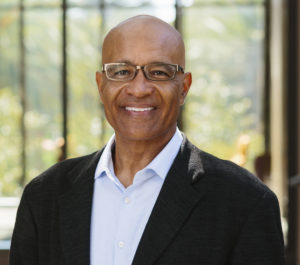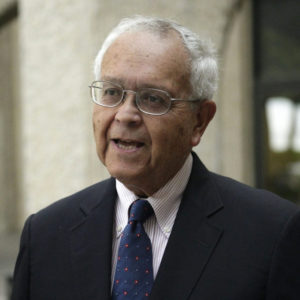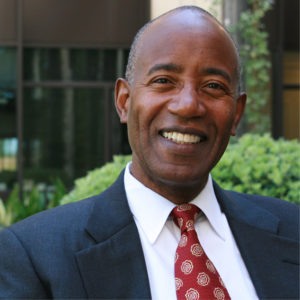Stanford Law Faculty on the Historic Confirmation of Judge Ketanji Brown Jackson to the Supreme Court
Thursday, April 7, 2022 was a historic day of firsts—and a reminder of how many still exist. The nomination by President Biden of Judge Ketanji Brown Jackson as the first Black woman to the U.S. Supreme Court was confirmed by the Senate in a largely party-line 53-47 vote. The American Bar Association rated Judge Jackson as “well qualified” to serve—its highest rating. The vote was overseen by Vice President Kamala Harris, the first Black and South Asian to hold that position. Judge Jackson, also the first public defender criminal defense lawyer to sit on the Court, will fill the seat of her former boss—retiring Justice Breyer (BA ’59), for whom she clerked. Here, Stanford Law School faculty members discuss Judge Jackson’s appointment.

From Ralph Richard Banks, (BA ’87, MA ’87), the Jackson Eli Reynolds Professor of Law at Stanford Law School, the co-founder and Faculty Director of the Stanford Center for Racial Justice, and Professor, by courtesy, at the Graduate School of Education:
The confirmation of Ketanji Brown Jackson to United States Supreme Court is significant in some ways that are obvious and in another way that is less so.
In the 1990s, a few years after I graduated law school, I clerked for a federal judge in New York, Barrington D. Parker, Jr. During my law school years, there weren’t many black judges, so few in fact that one could name nearly all of them from memory.
The confirmation of Ketanji Brown Jackson, who graduated law school after I did, is a testament to the extent to which that reality has changed. There are now, thankfully, too many black judges to remember. These judges are seeded throughout different levels of the judiciary. Ketanji Brown Jackson ascends to the Supreme Court having followed stints as both a district and appeals court judge.
The obvious reason that her appointment is significant has to do with her being black and being a woman, the first Supreme Court Justice to combine those identities. The significance of the symbolism of her appointment should not be understated. Our nation has long struggled with the question of who it’s really made for. At its founding, black people were treated as chattel, and even those who were free typically lacked the rights accorded their white counterparts. The disadvantaging of black people persisted well after the end of slavery and has repercussions that extend into the present. In light of the extent of continuing race-based disadvantage, the statement made by her appointment is an important one, one that can enlarge our cultural imagination of the kind of nation we can and must be.
Another reason that this appointment is significant is less noticed. When I was talking with my judge that day a quarter century ago, he emphasized the career pathway of those lawyers who would become judges. Sometimes they would have been prosecutors, but virtually never would they have been defense lawyers. Having worked on behalf of people accused of crimes was so disfavored as to almost be disqualifying. Ketanji Brown Jackson, alone among her new colleagues, has worked as a public defender protecting the interests of people accused of wrongdoing and confronted with the awesome power of the state arrayed against them. Her clients were no doubt some of the most impoverished and disadvantaged people in our nation. This sort of experience cannot but help shape her perspective. And it no doubt reflects her values as well, a commitment to be attentive to the needs, circumstances, and predicaments of the least of these. This is not to predict or forecast how she will rule in any particular case or even category of cases, but it does provide some comfort that the needs of the disadvantaged will be considered in the sanctum of the highest tribunal in the land. In bringing that experience to the court, she may well do what her predecessor, Thurgood Marshall, often did: educate his colleagues by using his experience to broaden and enrich theirs, so that they could gain some measure of understanding of the lives of people they had rarely or never encountered.
In contemplating the significance of her appointment, we should also temper our expectations. In the short term her presence is unlikely to dramatically change the outcomes in particular cases. But the long-term effects should not be understated. This is one setting where the tendency will be to overestimate the effects of change in the short term and underestimate its effects in the long term.

From Jeffrey L. Fisher, Professor of Law and Co-Director of the Supreme Court Litigation Clinic
So much has been said, and rightly so, about the historic nature of Justice Ketanji Brown Jackson’s confirmation to the Supreme Court. The appointment of a Black woman to the Court is long overdue, and it is heartening to see the Court evolving in recent years to look more like a microcosm of America itself. Because the Court reaches all of its decisions through processes of collective decision making, the late Justice White once said that every time a new justice joins the Court, the country gets not just a new justice but a new Court. It will be fascinating to see how our new Court develops.
Justice Jackson’s appointment is also historic in a secondary sense. She is the first former public defender to join the Court. This is another important milestone. About one-third of the cases the Court hears arise from criminal prosecutions. Having not just former prosecutors but also a former defender will help ensure a variety of perspectives are voiced inside the marble walls on One First Street. Justice Jackson’s presence on the High Court will also reinforce the value in our legal system of providing vigorous and ethical defense to any person whose liberty the government seeks to take away.

From William B. Gould IV, Charles A. Beardsley Professor of Law, Emeritus:
Justice Jackson…. To someone who cited and quoted the last Justice Jackson before her, this has a very nice ring. Like the great and consequential Thurgood Marshall who went before her, this Jackson’s appointment (she will become formally Justice this summer) is epochal.
Then Judge Jackson first came to my attention in 2018 when I read and distributed to my class her 100 page-plus opinion invalidating a Trump executive order circumscribing federal employees’ collective bargaining rights. Though later reversed by the DC Circuit Court of Appeals on administrative law grounds, her opinion was careful, thorough, deliberate, principled and, for me, exciting. Except for an exquisite opinion which she wrote from the DC circuit court bench to which she had been promoted, invalidating a ruling of the Federal Labor Relations Authority, I had no exposure to her judicial work until President Biden nominated her. Then, upon invitation, I wrote a memorandum on Jackson’s labor law and employment discrimination opinions. My first impression was affirmed.
The Justice to be holds great promise. Though I hardly subscribe to every conclusion and ruling she has made, the sweep and breadth of her work demonstrate the greatness of this appointment and yesterday’s confirmation. Judge Jackson’s fine work, her love of the United States, her balanced and principled decision making should resonate with all races. President Biden—and Senator Doug Jones of Alabama who guided her through the horrific trap-filled labyrinth which Washington has become— deserve honor for promoting her. I am sure that she will do this country proud.

From Michael W. McConnell, the Richard & Frances Mallery Professor of Law, Director of the Stanford Constitutional Law Center, and Senior Fellow at the Hoover Institution:
The question is not so much what kind of jurist Ketanji Brown Jackson is, but what kind of Justice she will choose to be. She will face the temptation to come out in full-throated opposition to the conservative direction of the current Court, and that is no doubt what many of her leftward supporters are hoping for. But a smarter play would be to seek common ground with the more moderate members of the conservative majority—especially Roberts, Kavanaugh, and Barrett—to swing the Court as a whole toward the middle. That will require restrained rhetoric, careful attention to legal detail, and openness to the kind of judicial reasoning she praised during the first day of her hearing, namely text, history, and precedent. On criminal law issues, which are presumably close to her heart as a former criminal defense lawyer, it would not be surprising to see her combine forces with the libertarian-leaning textualists on the Court, especially Gorsuch and sometimes Thomas. That is less likely to happen if she adopts the accusatory rhetoric often heard on the left.

From Jane S. Schacter, the William Nelson Cromwell Professor of Law:
Having just covered Dred Scott, Plessy v. Ferguson and Brown v. Board in my Fourteenth Amendment class, it was quite stirring to hear and share with the students the judge’s comment today that her parents had attended segregated schools and that her “family went from segregation to the Supreme Court in one generation.” The historic nature of Judge Jackson’s appointment cannot be overstated.
In addition to being the first African American woman on the Court, Judge Jackson brings other welcome experiences and perspectives to the Court. Her work as a public defender should enrich the Court’s understanding about the criminal justice system. And her many years of experience as a trial judge has given her the kind of daily exposure to the nuts and bolts—and strengths and weaknesses—of the justice system that no other member of the Court, save Justice Sotomayor, has had. Having read a number of her opinions, I was struck by how respectful she was of every case and every litigant before her, no matter how powerful or powerless.
Judge Jackson should make an extraordinary addition to the Court and I am eager to watch her serve.

From Shirin Sinnar, JD ’03, Professor of Law and John A. Wilson Faculty Scholar:
As many have noted, Justice Jackson’s judicial experience, knowledge of criminal defense and sentencing, and lived experience as an African American woman will offer important perspectives to the Court. At the same time, no one expects that a 6-3 polarized Court led by an ideologically driven conservative majority will significantly change its direction. This Court appears motivated to undo reproductive rights and affirmative action, strengthen an extreme interpretation of Second Amendment gun rights, and pursue “shadow docket” decisions that undercut the Court’s legitimacy. Diversification is important but never an antidote. The historic confirmation of Justice Jackson should not deflect from fundamental questions about the Court’s role and potential reforms.

From Ron Tyler, Professor of Law and Director of the Criminal Defense Clinic, and Suzanne Luban, Lecturer in Law and Associate Director of the Criminal Defense Clinic:
We are delighted to experience this historic moment. As Judge Jackson observed, after 232 years and 115 prior appointments, finally a Black woman has ascended to our highest court. The intersectionality of her achievement also shines through. Of course, she is only the third Black person to sit on the Court and only the sixth woman to do so. This is a beautiful moment for racial justice and for the past and future dreams of little Black and Brown kids of all genders.

Another historic first, particularly exciting from our perspective as criminal defense attorneys, is Ketanji Brown Jackson’s status as the first former public defender to sit on the Court. She will bring a critical perspective never before held by judges at the pinnacle of our legal system. Her decisions will be informed by actual service to indigent people. She knows how the criminal legal system impacts them and their families. She knows how that system sometimes treats marginalized people unfairly. Judge Jackson’s appointment is the preeminent example of the Biden Administration’s commitment to bring more former public defenders into the judiciary. We welcome this.
